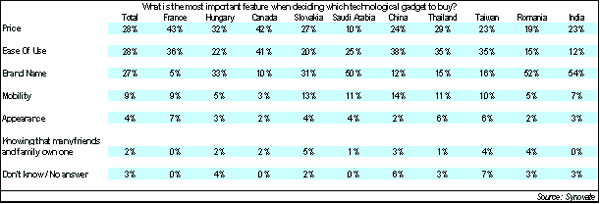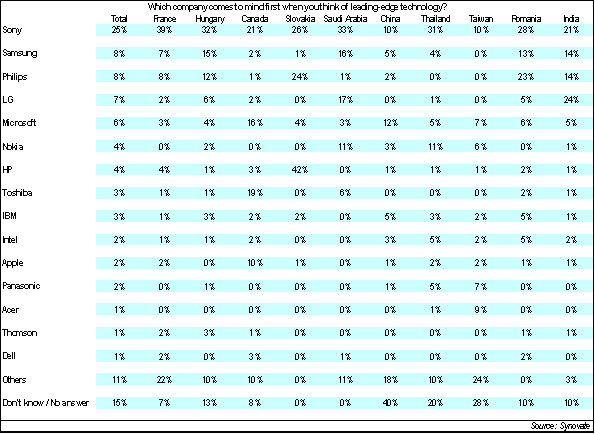Synovate surveyed 5,500 respondents in Canada, China, France, Hungary, India, Romania, Saudi Arabia, Slovakia, Taiwan and Thailand, asking about their attitudes toward the latest technological devices.
Having the newest technological gadget is important to a large majority of people in Saudi Arabia (87 percent), Romania (65 percent) and India (60 percent). And across all countries, 45 percent of respondents say that the could not live without their mobile phones, particularly Saudis (68 percent) and Thais (61 percent). Laptops are considered the next most indispensable piece of technology across the sample (9 percent), followed by plasma/LCD TVs (8 percent). Not surprisingly, respondents under the age of 35 are most attached to these and other electronic devices such as DVD or MP3 players and TiVo systems.
On the other hand, Canadians are the most blasé about technology, with 52 percent asserting that they could live without any of their high-tech gadgets. Robin Brown, Senior Vice President at Synovate Toronto, attributes this to a number of factors. "The older population relative to some of the developing markets surveyed is one. The less significant role that these products play in showing status in Canada is another. We also tend to see later adoption of mobile technology among consumers across North America compared to Europe due to the history of our phone systems."
When faced with a feast of choices among fast-changing technological devices, respondents are almost evenly split on what features are most important to them: Price and ease of use at 28 percent each, and brand name at 27 percent.
Ease of use is the priority for buyers in China (38 percent), Thailand and Taiwan (35 percent for both the latter). On the other hand, brand names are particularly important in India (54 percent), Romania (52 percent) and Saudi Arabia (50 percent). The latter respondents are also the least concerned with price (10 percent), in contrast to the cost-conscious French and Canadians (43 and 42 percent, respectively).
Andreas Gregoriou, Synovate's Managing Director for the Persian Gulf, says these findings echo the results of the Synovate PAX survey in the region, which found that affluent consumers across the Middle East are feeling very confident and spending freely on high-end products. "Saudi consumers, in particular, are eager to buy the latest technology, and most of them would not be concerned over prices. It is also interesting to note that only 0.3% of Saudis answered 'don't know' when asked what brand they associate with high-tech products, which shows that they are extremely brand conscious."

Synovate also probed attitudes toward new technology - particularly love, fear and caution. At the one end of the scale, 34 percent of Chinese love new technology and couldn't live without it, a feeling shared by 32 percent of Saudis. Most respondents globally (49 percent), however, say they are fascinated by technology but also cautious of it. And 29 percent of those surveyed - led by 44 percent of Thais and Slovaks - admit that it's too hard to keep up with all the latest technologies.
China's passion for new technology stems from the recent socio-economic past when, in the controlled economy, there was very little choice available, explains Darryl Andrew, Managing Director of Synovate China. "Relatively speaking, Chinese consumers now have a myriad of new choices - with technology being the best symbol of 'new' - and they exercise their right to choose with gusto."
"Another catalyst for this fascination is that mobile phones and the internet help them, particularly teens and younger adults, bridge a social chasm brought about by the one-child family. This technology allows them to reach out and extend their social network beyond the immediate geography where they live, and beyond their constrained nuclear family."
Synovate also uncovered some interesting demographic trends. More men than women often explain technology to their partner, friends and family (50 versus 30 percent) and spend a lot of time learning about new technological developments (41 versus 27 percent). And after the age of 45, the majority of respondents shift from being the ones explaining new technology to needing their partner, friends or family to show them how to use the latest gadgets.
But this perplexity does not dampen their enthusiasm: 58 percent of those above the age of 65 say that even if they don't always understand the latest technology, it looks cool!
Sony is cited by most respondents as the brand that leaps to mind when one thinks of cutting-edge technology, leading other manufacturers by a wide margin across all age ranges. Samsung and LG are the second most recognised brands amongst respondents under age 35, while Philips is more frequently associated with high technology by those above 35.

CURIOSITIES
> After mobile phones, men cite laptops as their most indispensable gadget; however, women consider a plasma/LCD TV the second most essential piece of technology.
> Contrary to popular stereotypes, MP3 players are not seen as much more necessary amongst the under-25s than older population segments (4 percent as opposed to 2 percent)
> Saudi consumers are the most eager early adopters in this survey, with 51 percent purchasing new technological products as soon as they are released.
About Synovate
Synovate, the market research arm of Aegis Group plc, generates consumer insights that drive competitive marketing solutions. The network provides clients with cohesive global support and a comprehensive suite of research solutions. Synovate employs over 5,500 staff in 108 cities across 50 countries. More information on Synovate can be found at www.synovate.com.
